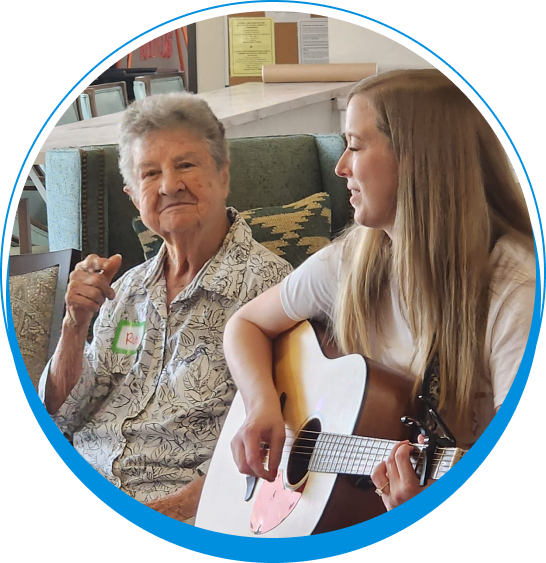By Cara Perkins, MS, MT-BC (HPMT)
From the writings of the ancient Greeks to treatment for World War II veterans, music has been used to positively influence the minds and well-being of individuals for centuries. It has been discovered to impact portions of the brain that may have been considered to be dormant or inactive. Years of research and documented evidence show how it increases awareness, improves interpersonal relations, supports cognitive maintenance, encourages moments of reminiscence and more.
And through the powerful practice of music therapy, you can strategically and meaningfully incorporate music to improve your loved one’s mental, physical and emotional health.
What Is Music Therapy?
As defined by the American Music Therapy Association, “Music Therapy is the clinical and evidence-based use of music interventions to accomplish individualized goals within a therapeutic relationship by a credentialed professional who has completed an approved music therapy program.” In short, a music therapist is a certified therapist who utilizes music as a tool to address physical, emotional, cognitive, social and spiritual needs.
Due to music’s universal and diverse nature, music therapy is extremely versatile and used in a variety of health care and mental health settings, including pediatrics, neuro rehabilitation and dementia care. When used as a treatment for dementia patients, it has been shown to provide opportunities for:
- Reminiscence and memory recall
- Improvements in mood and emotional states
- Awareness of self and environment, which accompanies increased attention to music
- Anxiety and stress reduction for dementia patients and caregivers
- Drug-free management of pain and discomfort
- Stimulation that provokes interest even when no other approach is effective
- Emotional intimacy when spouses and families share music-related experiences
- Social interaction with caregivers and families
When Did Music Therapy Become a Clinical Practice?
Regarded as “the medicine of the soul” as early as 600 B.C., music has been used throughout history to treat and manage a range of psychological conditions. From the 18th to the 19th centuries, music was used more frequently as a therapeutic tool and employed from a scientific and experimental approach; however, it wasn’t until after World War II and music’s use in the treatment for post-traumatic veterans that the “music therapy” profession was formally created. Today, the American Music Therapy Association (AMTA) educates and promotes the use of trained music therapists in clinical settings. According to the AMTA, there are over 8,000 board-certified music therapists and over 150 domestic and international institutions offering degrees in the discipline.
Other Benefits of Music Therapy
- It’s an established health care profession that requires a board certification
- Years of research and documented outcomes prove its viability and value
- Music is noninvasive
- It’s holistic and patient-centered
The lives of the residents and day program participants at the James L. West Center for Dementia Care are enriched every day through special programming and our full-time music therapist. Interested in incorporating music therapy into your loved one’s health care plan? Read about our MUSIC & MEMORY® program and contact us to learn more about our Music Therapy program at James L. West.
We are also honored to be able to share the benefits of music for all families living with dementia in our community by providing dementia-friendly concerts in collaboration with the Arts Council for Fort Worth and the Fort Worth Symphony Orchestra through our Nina Maria Cole Art & Music Series. Dementia-friendly performances with the Texas Ballet Theater will be announced on our website and social media channels in the near future.
For more information, please contact the James L. West Center at 817-877-1199 or ninamariacoleseries@jameslwest.org


